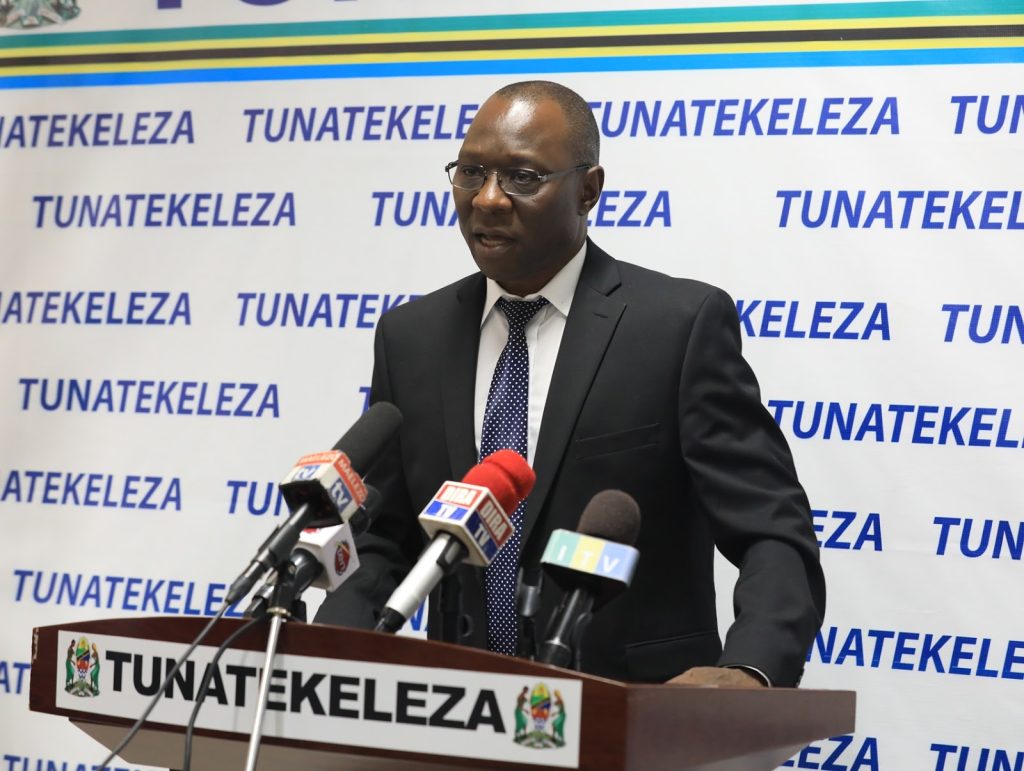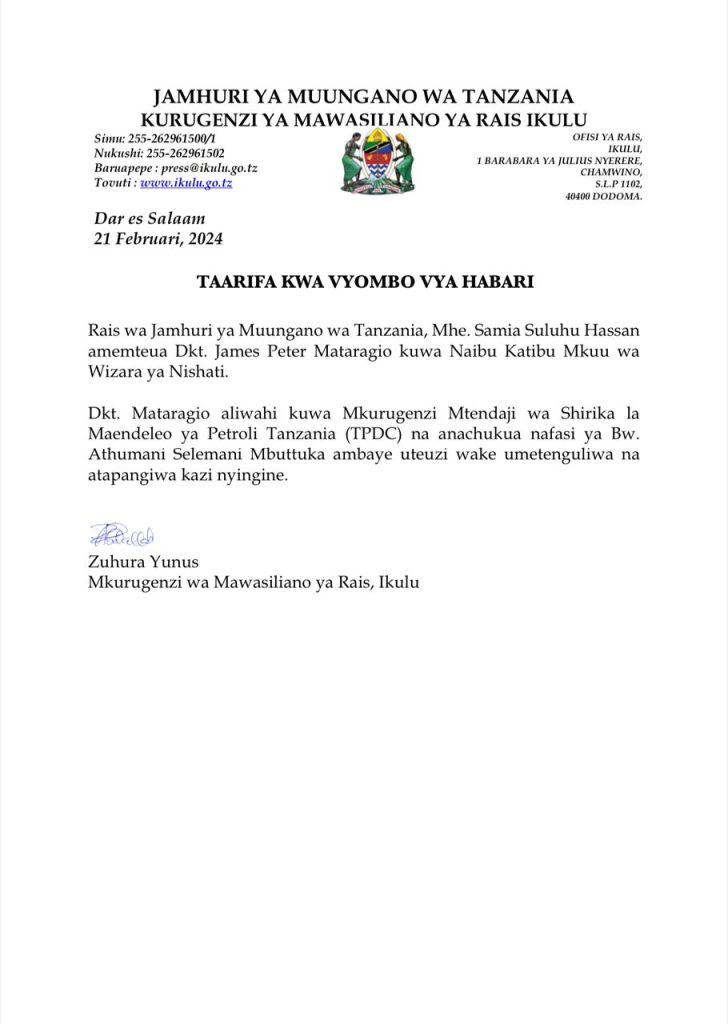TPDC’s top job has become a playground of a reshuffle after the reshuffle, indicating whoever is appointed to the top post must align himself to the appointer. The topmost docket of the Tanzania Petroleum Development Corporation (TPDC) has been awestruck by notable changes signalling uncertainty and doubts about the removed chief executives to abide by the appointer’s vision and expectations. This discussion chronicles the history of the most recent reshuffles and earmarks, the possible reasons behind them, and the ensuing turmoil reverberating in the energy sector.
In 2014, the then-president Jakaya Mrisho Kikwete appointed Dr James P. Mataragio as the Chief Executive of the TPDC. Part of the grounds cited for his appointment was that Dr. Mataragio was an astute geek in the intricacies of the energy sector. Dr. Mataragio is a Ph.D. (Geochemistry, Mineralogy, Structural Geology & Petroleum Geology) holder, was a Missouri University, USA graduate and a former senior Geoscientist at Bell Geospace, Houston, USA, with extensive experience in the energy sector.
So, the appointment of Dr. Mataragio was seen as a deliberate effort to outsource a proven professional who would spearhead new thinking in the energy sector. Everybody is worthy of his name and was impressed by the CV touted by Dr James Mataragio. Our expectations over his contributions in the energy sector were on cloud seven, to put it mildly. We were looking forward to a revamped energy policy that would place our domestic energy hunger at the forefront.
Read Related: Cheers to the Govt! Yet The Mnazi Bay Agreement Raised Unanswered Questions.
In August 2016, the TPDC Board of Directors suspended him and four other executives for abuse of public office. Mataragio and his four colleagues were suspended in August 2016 after audit queries raised red flags over the award of the survey deal to the U.S. firm in a series of payments between 2014 and 2016. The TPDC Board of Directors accused the five principal officers of awarding a USD 3.24 million airborne mining survey contract to U.S. firm Bell Geospace without authorization, flouting the procurement act and gross abuse of office.
The criminal charge sheet reflected and captured the grouses of the TPDC Board of Directors. Curiously, Mataragio worked for Bell Geospace in the U.S. as a geo-scientist for ten years before being appointed TPDC’s managing director in 2014. We can quickly glean why Mataragio and Bell Geospace had an exciting past to hook them up together once more!
The five TPDC top executives were prosecuted in a court of law. The matter was not concluded, and in 2021, five years after the commencement of the criminal proceedings, the then president, Dr. John Pombe Magufuli, reinstated Dr. Mataragio and, by extension, ended his legal troubles.
Before that, there were other intrigues involving the then minister for energy and minerals, Professor Sospeter Muhongo, who was fired in 2019 for allegations of under-declared value of gold by Barrick Gold, leading to the split of the Ministry of Energy and Minerals into two ministries: energy and minerals. The mining industry contributes over 4% of the national gross domestic product.
The Late President John Magufuli appointed Angellah Kairuki as the new Minister for Minerals. The then 41-year-old lawyer by training previously had served as Minister of State in the president’s office, responsible for public service management and good governance.
Medard Kalemani, 41, was then promoted from Deputy Minister of Energy and Minerals to lead the new Ministry of Energy. He has worked as its legal affairs director at the Ministry of Energy and Minerals for over a decade. It is unclear how the removal of Professor Sospeter Muhongo and his replacement of Medard Kalemani influenced the termination of the criminal proceedings against Dr Mataragio and four others and their reinstatement at the TPDC. The ministerial changes helped restore Dr. Mataragio’s fortunes at the TPDC for reasons that are not straightforward.
After the death of Dr Magufuli, his successor, Dr Samia Suluhu Hassan, dismissed Dr Mataragio on April 04th, 2021, only to reinstate him in less than 24 hrs following a blitz of criticism by the Netizens on Twitter before he was recast as X. The Netizens chided his replacement, one Thobias Mwesiga, a CCM diehard for lack of the necessary gravitas to fill the shoes of Dr Mataragio. In the wee hours of the same day of reckoning, the president, who was barely in office after being sworn in, succumbed under pressure, revoked the Mwesiga appointment at TPDC and restored Dr Mataragio.
Also, read Samia Suluhu Hassan’s Appointment to the GCA Explained.
However, keen observers instinctively knew the days of Dr. Mataragio at the helm of the TPDC were numbered and finished. It was no longer a question of “if but when” he will be shown the door. On February 24th, 2023, the suspicion of his dismissal was proven true to the letter as President Samia Suluhu Hassan replaced him with Dr. Mohamed Makame. Still, Dr. Mataragio was promised sweeteners amounting to a soft landing. Dr. Mataragio would be assigned other duties, and on February 21st 2024, the learned doctor was appointed the deputy permanent secretary in the same ministry of energy.
Dr. Mohamed Makame was an immediate member of the TPDC before his elevation, but it was unclear whether he was on the Board of Directors, which had clashed with Dr. Mataragio. And whether that legal quasi-bureaucratic altercations were relevant to our discourse. But, we know that the most recent shakeup at the TPDC came amid heated discussions over planned private investments in the energy sector, in which the TPDC played a bellwether role.
When the guillotine was being dropped at the TPDC, the TPDC was immersed in negotiations involving a USD 30 billion liquefied Natural Gas (LNG) plant project with BP Shell. We all know who owns the BP Shell that is wallowing in the colonial mentality of perceiving former colonies as sources of cheap labour and raw materials.
BP Shell is not in the business of tackling our energy crunch but is hellbent on shipping LNG to the E.U., solving their cheap power drought that is now threatening to deindustrialize the E.U. following her self-inflicted pain of jettisoning Russian cheap energy to appease her newfound colonial masters: the US who has promised them nuclear deterrence for poverty!
The E.U. is increasingly treading the path of unprecedented unemployment, risking a civil war as class struggle among various factions threatens to tear that union into shards. This BP Shell LNG plant will be looting our natural gas, depriving us of industrial jobs and condemning our youth into an abyss of joblessness and hopelessness. It is as if, by design, we are in the business of churning out future “panya roads”. In summary, the BP Shell pact asserts our economic satellite relationship with the E.U. sixty-two years after gaining independence! We must be ashamed of ourselves.
TPDC at that time was also at the thick and thin of clearing the path for Ugandan oil to be shipped through a pipeline towards Tanga port to the E.U. There were sweeteners to assuage us, but they should not have been sufficient to twist our arms. We should have asked for at least a third of the black gold to be processed locally for domestic consumption, but who fights for us these days as every leader is busier melting their problems?
Then, the TPDC was negotiating about the Mnazi Bay Development project. Under new leadership at the TPDC, we just picked the rotten end of the stick. With a golden opportunity for the TPDC to own 51.18% of the company’s shares, we crafted an agreement that left us as a minority shareholder of a mere 40%. Another opportunity squandered to play a pivotal role in managing a massive chunk of natural gas.
We need no guesswork that what is buried underneath our subsoil is estimated to be over 51 trillion cubic feet of natural gas that may or may not catapult us to the developed world status with annual per capita of over 50 grand. Still, we may also remain at the economic basement, with most Tanzanians eking out a dollar daily in gratitude for the avaricious status quo that seeks to sustain neocolonial appetites.


